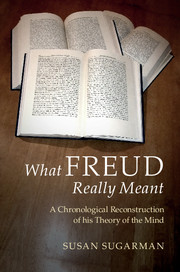Book contents
- Frontmatter
- Dedication
- Contents
- Acknowledgments
- Introduction
- 1 Freud on psychoanalysis: Five Lectures on Psychoanalysis (1909a)
- 2 The pleasure and reality principles: “Formulations regarding two principles in mental functioning” (1911); “The psychology of the dream-processes” from The Interpretation of Dreams” (1900)
- 3 Ambivalence and the origin of the civilized mind: “Taboo and emotional ambivalence” from Totem and Taboo (1913b)
- 4 Narcissism as a stage in development: “On narcissism: an introduction” (1914)
- 5 The impetus to the mind: “Instincts and their vicissitudes” (1915a)
- 6 The possibility of repression: “Repression” (1915b); “Negation” (1925a)
- 7 The unconscious and the structure of the mind: “The unconscious” (1915c)
- 8 Beyond the pleasure principle: Beyond the Pleasure Principle (1920)
- 9 A new architecture of the mind: The Ego and the Id (1923)
- 10 Pleasure revised: “An economic problem in masochism” (1924)
- 11 Civilization, morality, and the pursuit of pleasure: Civilization and its Discontents (1930)
- Epilogue: What Freud really meant
- References
- Index
6 - The possibility of repression: “Repression” (1915b); “Negation” (1925a)
Published online by Cambridge University Press: 05 April 2016
- Frontmatter
- Dedication
- Contents
- Acknowledgments
- Introduction
- 1 Freud on psychoanalysis: Five Lectures on Psychoanalysis (1909a)
- 2 The pleasure and reality principles: “Formulations regarding two principles in mental functioning” (1911); “The psychology of the dream-processes” from The Interpretation of Dreams” (1900)
- 3 Ambivalence and the origin of the civilized mind: “Taboo and emotional ambivalence” from Totem and Taboo (1913b)
- 4 Narcissism as a stage in development: “On narcissism: an introduction” (1914)
- 5 The impetus to the mind: “Instincts and their vicissitudes” (1915a)
- 6 The possibility of repression: “Repression” (1915b); “Negation” (1925a)
- 7 The unconscious and the structure of the mind: “The unconscious” (1915c)
- 8 Beyond the pleasure principle: Beyond the Pleasure Principle (1920)
- 9 A new architecture of the mind: The Ego and the Id (1923)
- 10 Pleasure revised: “An economic problem in masochism” (1924)
- 11 Civilization, morality, and the pursuit of pleasure: Civilization and its Discontents (1930)
- Epilogue: What Freud really meant
- References
- Index
Summary
It is not easy in theory to deduce the possibility of such a thing as repression.
– S. Freud, “Repression,” 1915b, p. 146Our impulses are fated to meet with obstruction, none more arresting than the threat of negative repercussions should we act on an impulse that produces them. Repression, like the “vicissitudes” in which impulses reverse into their opposite or turn around on the self (see Chapter 5), affords a way in which we may avoid such repercussions. It is a complicated way, involving an action by the entire ego fearful not only of bad material consequences, but also of a fall in its worth; sublimation has the same origin but employs a different mechanism of deflection. Of all the vicissitudes an instinct may undergo, repression inflicts the greatest psychological cost.
Repression consists of barring entry of a germinating impulse into consciousness in order to keep it from discharging. It operates by prompting a withdrawal of consciousness from the impulse, much as we might withdraw our hand from a hot stove. But because it flows from a judgment, however fleeting and unthinking, Freud characterizes it as falling between flight, which the withdrawal from a hot stove would represent, and condemnation, an act of deliberative judgment (1915b, p. 146).
This chapter tracks Freud's principal paper on repression (1915b), addressing, in turn, the conceptual puzzle raised by repression, the course of repression, and its psychological cost. The paper seeds Freud's later paper on negation, which provocatively illustrates a conscious equivalent of repression and offers an illuminating reconceptualization of the pleasure and reality principles. The chapter concludes with a brief discussion of that paper.
“REPRESSION” (1915b)
Instinctual impulses inherently seek discharge. Discharging them produces pleasure; not discharging them creates pain. But, Freud points out, although satisfying an impulse always leads to pleasure, satisfaction of, say, an incestuous or hostile urge could also cause unpleasure on account of other interests; those other interests might include safety, our parents’ love and protection, or others’ approbation. When the motive to avoid the unpleasure associated with satisfaction of an impulse becomes stronger than the motive to attain the pleasure expected from it we may repress the impulse.
- Type
- Chapter
- Information
- What Freud Really MeantA Chronological Reconstruction of his Theory of the Mind, pp. 62 - 72Publisher: Cambridge University PressPrint publication year: 2016



